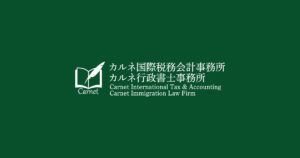Corporate Tax Return Filing Deadline (Standard Rules, Extensions, and Interest Tax) — 2025 Edition
🔹 1. Standard Filing Deadline
A corporation must file and pay its corporate income tax return within two months after the end of its fiscal year.
Example:
If the fiscal year ends on March 31 → the filing deadline is May 31 (or the next business day if that date falls on a weekend or holiday).
Within this period, the corporation must submit:
- The corporate tax return (final return)
- Schedules such as the breakdown of accounts
- Financial statements and tax schedules (balance sheet, income statement, etc.)
🔹 2. Extension of Filing Deadline (Special Provision)
If the determination of accounts (e.g., approval at the shareholders’ meeting) is delayed, the corporation may extend its filing deadline by one month, by filing the “Application for Extension of Filing Due Date for the Final Return of Corporate Tax” with the tax office in advance.
Example:
Fiscal year ending March 31 → if an extension is approved → new filing deadline is June 30.
This extension also automatically applies to:
- Corporate inhabitant tax (local tax)
However, it does not automatically apply to:
- Corporate enterprise (business) tax
- Consumption tax
- Withholding income tax
⚠️ 3. Separate Extension Required for Corporate Enterprise (Business) Tax
This is a critical point.
For corporate enterprise (business) tax, a separate application must be filed with the relevant prefectural tax office.
The national tax extension does not automatically extend the local business tax deadline.
✅ Filing authority: Prefectural tax office
✅ Application form: “Application for Extension of Filing Due Date for Enterprise Tax”
✅ Filing deadline: Generally by the last day of the fiscal year
If this application is not filed, the business tax return will not be considered extended, even if the corporate tax filing is.
🔹 4. Payment Timing and Interest Tax
When an extension is granted, both the filing and payment deadlines are extended.
However, interest tax (利子税) will still apply to the portion of tax that remains unpaid after the original statutory due date.
Example:
Fiscal year ending March 31 (original due date: May 31)
Filing extension granted until June 30.
If payment is made after May 31, interest tax accrues for the period from June 1 to June 30.

